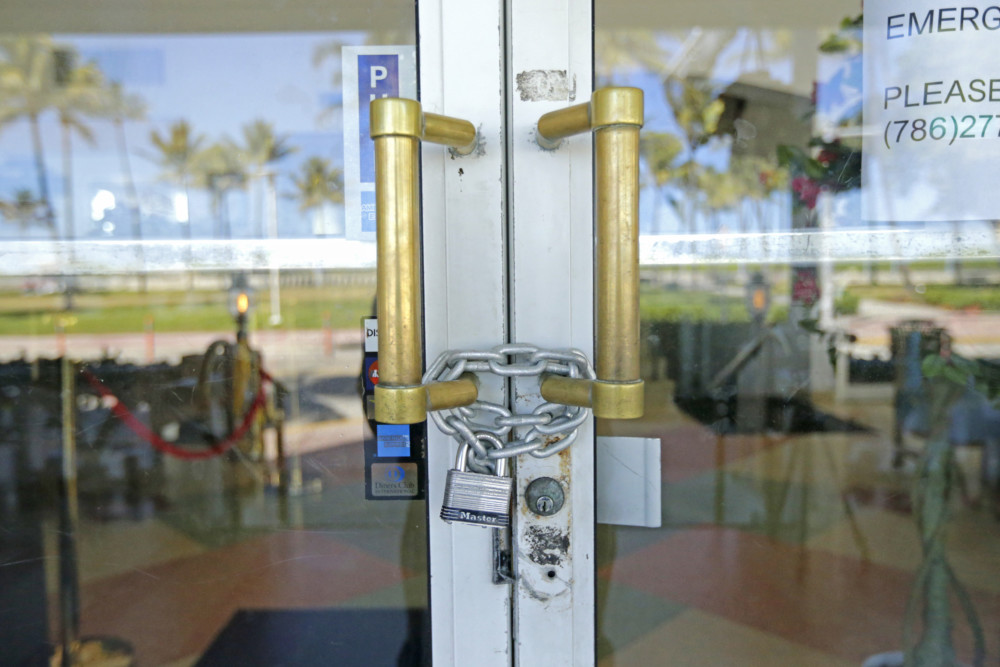By Lindsey McPherson
CQ-Roll Call
WWR Article Summary (tl;dr) As Lindsey McPherson reports, “Trump’s four-part tweet announcing the end of negotiations criticized Pelosi as “asking for $2.4 trillion dollars to bailout poorly run, high crime, Democrat states, money that is in no way related to COVID-19.”
Washington
Republicans will stop negotiating a new COVID-19 aid bill with Speaker Nancy Pelosi amid a long-standing disagreement over funding for state and local governments, President Donald Trump announced on Twitter on Tuesday.
“I have instructed my representatives to stop negotiating until after the election when, immediately after I win, we will pass a major stimulus bill that focuses on hardworking Americans and small business,” Trump said.
The president’s announcement comes shortly after he held a phone call with Treasury Secretary Steven Mnuchin, who had been negotiating with Speaker Nancy Pelosi, Senate Majority Leader Mitch McConnell and House Minority Leader Kevin McCarthy. A GOP aide confirmed the call occurred but was unable to share details of the conversation.
McConnell later told reporters he agreed with Trump’s decision to end negotiations. “I think his view was that they were not going to produce a result and that we needed to concentrate on what’s achievable,” the Kentucky Republican said.
Trump’s tweets came as House Democrats held a conference call where Pelosi had provided her members a brief update on her talks with Mnuchin.
The speaker communicated that a deal was not close and that state and local aid was still a sticking point, according to a source on the call who requested anonymity to share details of the private discussion.
“Walking away from coronavirus talks demonstrates that President Trump is unwilling to crush the virus,” Pelosi said in a statement, as well as the president’s “contempt for science” and refusal to help workers in need.
The speaker and Mnuchin continued with their scheduled 3:30 p.m. phone call, where Mnuchin confirmed that Trump “walked away from COVID talks,” according to Pelosi spokesman Drew Hammill. “The speaker expressed her disappointment in the president’s decision to abandon the economic & health needs of the American people,” Hammill tweeted.
Trump’s four-part tweet announcing the end of negotiations criticized Pelosi as “asking for $2.4 trillion dollars to bailout poorly run, high crime, Democrat states, money that is in no way related to COVID-19.” He was referring to a rough total cost of the $2.2 trillion bill the House passed last week, which included $436 billion in direct aid to state and local governments.
Mnuchin provided a $1.6 trillion counteroffer to Pelosi, which Trump called “very generous,” that included $250 billion in direct state and local aid. It is unclear if Pelosi and Mnuchin got any closer on the state and local funding amount since Mnuchin made his counteroffer last Wednesday.
Pelosi, however, told her caucus Tuesday that there was never a $1.6 trillion offer, according to the source on the call.
Trump blamed Pelosi for the lack of progress in negotiations, saying the speaker “is not negotiating in good faith.” Democrats have similarly blamed Trump and his administration, as well as McConnell, for not understanding the gravity of the needs and continuously undervaluing the amount of aid needed.
Leaders of the 50-member, bipartisan Problem Solvers Caucus, which had put together a $1.5 trillion framework that Mnuchin used as the basis for his offer, put out a statement claiming a deal was within reach and urging leaders of both parties, including the president, to reverse course and get an agreement.
“Inaction is not an option,” co-chairs Josh Gottheimer, D-N.J., and Tom Reed, R-N.Y., said in the statement with Reps. Dusty Johnson, R-S.D., and Dean Phillips, D-Minn., who led the working groups that came up with the $1.5 trillion plan.
Earlier Tuesday, Federal Reserve Chairman Jerome Powell reiterated his contention that more fiscal support from Congress is needed.
“Too little support would lead to a weak recovery, creating unnecessary hardship for households and businesses. Over time, household insolvencies and business bankruptcies would rise, harming the productive capacity of the economy and holding back wage growth,” Powell said at the National Association of Business Economics annual meeting. “By contrast, the risks of overdoing it seem, for now, to be smaller. Even if policy actions ultimately prove to be greater than needed, they will not go to waste.”
Pelosi had quickly put out a statement citing Powell’s comments as evidence that “robust action is immediately needed to avert economic catastrophe from the devastation of the coronavirus pandemic” and urging Republicans to get on board with a large aid package.
The end of relief talks means the House will have no reason to return to Washington before the election, unless Democrats want to try to pass piecemeal aid bills they think the Republican Senate may accept. For example, Pelosi last week promised the airlines, which have laid off or furloughed tens of thousands of workers, that additional payroll support would be coming through either a comprehensive aid package or a stand-alone bill.
Association of Flight Attendants-CWA International President Sara Nelson accused Trump of blowing up a potential bipartisan deal. She said in a statement that the union would hold emergency meetings Tuesday “to determine our options to protect people and keep them from harm.”
Republicans abandoning the coronavirus relief talks means the Senate is free to fully focus on U.S. Circuit Judge Amy Coney Barrett’s nomination to the Supreme Court. Trump in his tweets said he urged McConnell to “not to delay, but to instead focus full time” on Barrett’s confirmation.
Trump also cited the stock market, jobs and unemployment levels as reasons another relief package can wait until after the election, as he optimistically claimed in all caps: “THE BEST IS YET TO COME!”
Major U.S. stock indexes all closed lower Tuesday, dipping sharply after Trump’s tweets calling off aid talks. But the losses mostly just offset the prior day’s gains, and stock prices on average remain near all-time highs.
___
(Jim Saksa and Jessica Wehrman contributed to this report.)
___
Distributed by Tribune Content Agency, LLC.















































































































































































































































































































































































